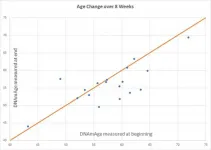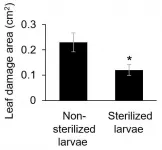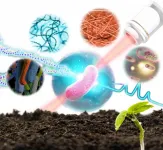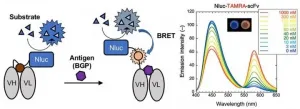Three years younger in just eight weeks? A new study suggests yes!
A groundbreaking clinical trial shows we can reduce biological age (as measured by the Horvath 2013 DNAmAge clock) by more than three years in only eight weeks with diet and lifestyle through balancing DNA methylation
2021-05-27
(Press-News.org)
A groundbreaking clinical trial shows we can reduce biological age (as measured by the Horvath 2013 DNAmAge clock) by more than three years in only eight weeks with diet and lifestyle through balancing DNA methylation.
A first-of-its-kind, peer-reviewed study provides scientific evidence that lifestyle and diet changes can deliver immediate and rapid reduction of our biological age. Since aging is the primary driver of chronic disease, this reduction has the power to help us live better, longer.
The study, released on April 12, utilized a randomized controlled clinical trial conducted among 43 healthy adult males between the ages of 50-72. The 8-week treatment program included diet, sleep, exercise and relaxation guidance, and supplemental probiotics and phytonutrients, resulting in a statistically significant reduction of biological age--over three years younger, compared to controls.
The study was independently conducted by the Helfgott Research Institute, with laboratory assistance from Yale University Center for Genome Analysis, and the results independently analyzed at McGill University and the National University of Natural Medicine.
The study's lead author, Kara Fitzgerald ND IFMCP, stated that "the combined intervention program was designed to target a specific biological mechanism called DNA methylation, and in particular the DNA methylation patterns that have been identified as highly predictive of biological age. We suspect that this focus was the reason for its remarkable impact. These early results appear to be consistent with, and greatly extend, the very few existing studies that have so far examined the potential for biological age reversal. And it is unique in its use of a safe, non-pharmaceutical dietary and lifestyle program, control group, and the extent of the age reduction. We are currently enrolling participants for a larger study which we expect will corroborate these findings."
Leading epigeneticist Moshe Szyf PhD of McGill University and co-author on the study adds, "The uniqueness of Dr Fitzgerald approach is that her trial devised a natural but mechanistic driven strategy to target the methylation system of our body. This study provides the first insight into the possibility of using natural alterations to target epigenetic processes and improve our well being and perhaps even longevity and lifespan."
DNA methylation patterns have become a leading means by which scientists evaluate and track biological aging, a term used to describe the accumulation of damage and loss of function to our cells, tissues and organs. This damage is what drives diseases of aging. "What is extremely exciting," commented Dr. Fitzgerald, "is that food and lifestyle practices, including specific nutrients and food compounds known to selectively alter DNA methylation, are able to have such an impact on those DNA methylation patterns we know predict aging and age-related disease. I believe that this, together with new possibilities for us all to measure and track our DNA methylation age, will provide significant new opportunities for both scientists and consumers."
INFORMATION:
To read the study: https://www.aging-us.com/article/202913
For background information on aging and DNA methylation: https://www.drkarafitzgerald.com/2021/04/13/biological-aging-and-methylation/
For press/interviews contact: media@drkarafitzgerald.com
About Aging-US
Launched in 2009, Aging-US publishes papers of general interest and biological significance in all fields of aging research as well as topics beyond traditional gerontology, including, but not limited to, cellular and molecular biology, human age-related diseases, pathology in model organisms, cancer, signal transduction pathways (e.g., p53, sirtuins, and PI-3K/AKT/mTOR among others), and approaches to modulating these signaling pathways.
To learn more about Aging-US, please visit http://www.Aging-US.com or connect with @AgingJrnl
Aging-US is published by Impact Journals, LLC please visit http://www.ImpactJournals.com or connect with @ImpactJrnls
Media Contact
18009220957x105
MEDIA@IMPACTJOURNALS.COM
[Attachments] See images for this press release:
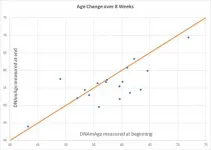
ELSE PRESS RELEASES FROM THIS DATE:
2021-05-27
The bacterium, which they named Candidatus Phytoplasma dypsidis was found to cause a fatal wilt disease. This new discovery was reported in the International Journal of Systematic and Evolutionary Microbiology.
In 2016, several ornamental palms within a conservatory in the Cairns Botanic Gardens, Queensland, died mysteriously. A sample was taken from one of the diseased plants and investigated by Dr Richard Davis and colleagues from the Australian Government Department of Agriculture, Water and the Environment, and state and local government. They compared the characteristics and genome of the bacterium identified as the cause of the disease and found the ...
2021-05-27
Study Exploring Optimization of Duplex Velocity Criteria for Diagnosis of Internal Carotid Artery (ICA) Stenosis Published Online
Online first in Vascular Medicine, researchers from the Intersocietal Accreditation Commission (IAC) Vascular Testing division report findings of their multi-centered study of duplex ultrasound for diagnosis of internal carotid artery (ICA) stenosis. 1
The study was developed in response to wide variability in the diagnostic criteria used to classify severity of ICA stenosis across vascular laboratories nationwide and following a survey of members of IAC-accredited ...
2021-05-27
Aging published "Potential reversal of epigenetic age using a diet and lifestyle intervention: a pilot randomized clinical trial" which reported on a randomized controlled clinical trial conducted among 43 healthy adult males between the ages of 50-72. The 8-week treatment program included diet, sleep, exercise and relaxation guidance, and supplemental probiotics and phytonutrients. Genome-wide DNA methylation analysis was conducted on saliva samples using the Illumina Methylation Epic Array and DNAmAge was calculated using the online Horvath DNAmAge clock (also published in Aging). The diet and lifestyle treatment was associated with a 3.23 years decrease in DNAmAge compared with controls. DNAmAge of those in the treatment group decreased by an average 1.96 ...
2021-05-27
More than 500,000 people have died from COVID-19 in Latin America and the Caribbean, demonstrating the health and economic inequalities throughout the region. A new article analyzes seven books* that discuss these inequalities, including questions of who gets health care and what interdependent roles societies, social movements, and governments play. To end inequality in the region, the author calls for a universal approach to health care.
The article, by a professor at Carnegie Mellon University (CMU), appears in the June 2021 issue of Latin American Research Review, a journal published by the Latin American Studies Association.
"These books break new ground and contribute to our understanding of some of the most important health ...
2021-05-27
Although insect larvae may seem harmless to humans, they can be extremely dangerous to the plant species that many of them feed on, and some of those plant species are important as agricultural crops. Although plants cannot simply flee from danger like animals typically would, many have nonetheless evolved ingenious strategies to defend themselves from herbivores. Herbivorous insect larvae will commonly use their mouths to smear various digestive proteins onto plants that they want to eat, and when plants detect chemicals commonly found in these oral secretions, ...
2021-05-27
AMES, Iowa - Materials engineers don't like to see line defects in functional materials.
The structural flaws along a one-dimensional line of atoms generally degrades performance of electrical materials. So, as a research paper published today by the journal Science reports, these linear defects, or dislocations, "are usually avoided at all costs."
But sometimes, a team of researchers from Europe, Iowa State University and the U.S. Department of Energy's Ames Laboratory report in that paper, engineering those defects in some oxide crystals can actually increase electrical performance.
The research team - led by Jürgen Rödel and Jurij Koruza of the Technical University of Darmstadt in Germany - found certain defects produce significant improvements in two key measurements ...
2021-05-27
Researchers from the Single-Cell Center at the Qingdao Institute of Bioenergy and Bioprocess Technology (QIBEBT) of the Chinese Academy of Sciences have developed a technique to sort and sequence the genome of bacteria in soil one bacterial cell at a time, while also identifying what its function is in the soil environment.
Their study was published in the journal mSystems on May 27.
Soil is home to a vast and complex microbiome, which features arguably the highest genomic diversity and widest heterogeneity of metabolic activities of cells on Earth. In turn, these metabolic activities can in principle provide the foundation for industrial production of numerous compounds of value.
The ability to pinpoint ...
2021-05-27
Immunosensors are widely used in immunoassays to detect antigens. One such immunosensor is a quenchbody (Q-body), which contains a modified antibody fragment with a quenched fluorescent dye. When an antigen binds to the Q-body, the dye leaves the antibody and the fluorescence intensifies. The change in fluorescence intensity is easy to measure, making Q-body-based antigen detection systems incredibly simple. However, this method requires an external light source to excite the electrons in the fluorescent dye to produce luminescence.
One way to solve this is to induce luminescence by an alternative method. To achieve this, researchers ...
2021-05-27
EUGENE, ORE. -- May 27, 2021 -- Climate skeptics who aren't persuaded by the existing evidence from climate change are unlikely to change their minds for many years, according to a newly published quantitative study by a University of Oregon environmental economist
The central question posed by the study published in the journal Climate Change was "How much evidence would it take to convince skeptics that they are wrong?" The answer depended on the degree of skepticism. The study modeled two types of hypothetical skeptics -- those who were less extreme and believed the change in temperature was slight, as well as ...
2021-05-27
While earlier research has mostly looked into factors such as fear, perceived risk, age and political views to determine what makes individuals and societies more or less willing to drastically change their lifestyle and support government-imposed strict restrictions, in order to mitigate the spread of the COVID-19 pandemic, psychologists at the University of Zurich Charlotte Kukowski, Katharina Bernecker and Veronika Brandstätter took a different perspective.
Instead, they chose to find out the impact of people's perception of others' behaviour when it comes to the public good, as well as people's own self-control in sticking to behaviour guidelines. By using data from the United Kingdom and Switzerland, they concluded that, ...
LAST 30 PRESS RELEASES:
[Press-News.org] Three years younger in just eight weeks? A new study suggests yes!
A groundbreaking clinical trial shows we can reduce biological age (as measured by the Horvath 2013 DNAmAge clock) by more than three years in only eight weeks with diet and lifestyle through balancing DNA methylation

